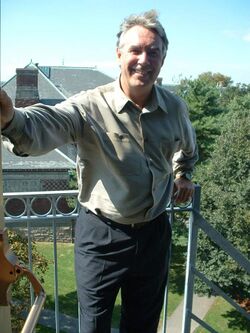Biography:Michael Duff (physicist)
Michael Duff | |
|---|---|
 | |
| Born | Michael James Duff January 28, 1949[1] Manchester |
| Nationality | British |
| Alma mater | Queen Mary College, London (B.Sc.) Imperial College London (Ph.D.) |
| Known for | Coining the term "p-brane"[2] |
| Scientific career | |
| Fields | Theoretical physics, supergravity, string theory, M-theory |
| Institutions | Imperial College London European Organization for Nuclear Research International Centre for Theoretical Physics Queen Mary College, London Texas A&M University University of Michigan |
| Doctoral advisor | Abdus Salam |
Michael James Duff FRS, FRSA is a British theoretical physicist and pioneering theorist of supergravity who is the Principal of the Faculty of Physical Sciences and Abdus Salam Chair of Theoretical Physics at Imperial College London.
Education
Duff completed his Bachelor of Science in Physics Queen Mary College, London in 1969. He then went on to his Doctor of Philosophy in theoretical physics in 1972 at Imperial College London supervised by the Nobel Laureate Abdus Salam. He did postdoctoral fellowships at the International Centre for Theoretical Physics, University of Oxford, King's College London, Queen Mary College London and Brandeis University.
Academic career
After his postdoctoral fellowships, he returned to Imperial College in 1979 on a Science Research Council Advanced Fellowship and joined the faculty there in 1980. He took leave of absence to visit the Theory Division in CERN, first in 1982 and then again as a Staff Member from 1984 to 1987 when he became Senior Physicist. He has held Visiting Professorships and Fellowships at the University of Texas, Austin; the University of California, Santa Barbara, the University of Kyoto and the Isaac Newton Institute, University of Cambridge. He took up his professorship at Texas A&M University in 1988 and was appointed Distinguished Professor in 1992. In 1999 he moved to the University of Michigan, where he was Oskar Klein Professor of Physics. In 2001, he was elected first Director of the Michigan Center for Theoretical Physics and was re-elected in 2004. He returned again to Imperial College, London and became Professor of Physics and Principal of the Faculty of Physical Sciences in 2005. He was appointed Abdus Salam Professor of Theoretical Physics in 2006. He won the Dirac Medal of the IOP in 2017.
Contributions
His interests lie in unified theories of the elementary particles, quantum gravity, supergravity, Kaluza–Klein theory, superstrings, supermembranes and M-theory.[3] He is a Fellow of the Royal Society, a Fellow of the American Physical Society, a Fellow of the Institute of Physics (UK), a Fellow of the Royal Society of Arts and Recipient of the 2004 Meeting Gold Medal, El Colegio Nacional, Mexico.
He is the editor of The World in Eleven Dimensions: Supergravity, Supermembranes and M-theory, ISBN:0-7503-0672-6.[4], a collection of notable scientific articles on string theory.
References
- ↑ Curriculum Vitae
- ↑ Duff, M.J.; Inami, T.; Pope, C.N.; Sezgin, E.; Stelle, K.S. (1988). "Semiclassical quantization of the supermembrane". Nuclear Physics B 297 (3): 515–538. doi:10.1016/0550-3213(88)90316-1. Bibcode: 1988NuPhB.297..515D. http://cds.cern.ch/record/178617/files/198707029.pdf.
- ↑ Duff, Michael (May 2010). "Black holes and qubits". CERN Courier 50 (4): 14–16. https://cds.cern.ch/record/1734511.
- ↑ Duff, M. J., ed (1999). The World in Eleven Dimensions: Supergravity, Supermembranes and M-theory. ISBN 978-0-7503-0672-0.
External links
- Imperial College faculty page for Duff
- {{INSPIRE-HEP author}} template missing ID and not present in Wikidata.
- Duff, M. J. (2007). "Recent applications of the Weyl Anomaly". Mathematical Physics. Prof. Michael Duff presented and published his paper in National Center for Physics in Islamabad, Pakistan. pp. 90–101. doi:10.1142/9789812770523_0012. ISBN 978-981-270-591-4. Bibcode: 2007maph.conf...90D. http://www.ncp.edu.pk/docs/12th_rgdocs/M.J.Duff.pdf. Retrieved 17 January 2013.

